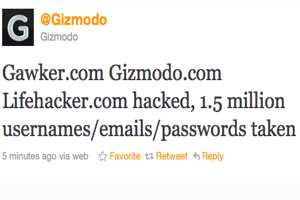 The password fears that have been floating around the net for over a week are a very interesting case study for the history of the internet. When hackers exploited a security hole in the Gawker Media network’s servers they came out with a huge list of user credentials. So anyone that has a “commenting account” in one of Gawker Media’s websites (i.e. Lifehacker, Gizmodo, Gawker) has had their username/password combination released to the public at large – by the way, we’re talking about 1.3 million registered users – this is serious enough that the FBI is on the case.
The password fears that have been floating around the net for over a week are a very interesting case study for the history of the internet. When hackers exploited a security hole in the Gawker Media network’s servers they came out with a huge list of user credentials. So anyone that has a “commenting account” in one of Gawker Media’s websites (i.e. Lifehacker, Gizmodo, Gawker) has had their username/password combination released to the public at large – by the way, we’re talking about 1.3 million registered users – this is serious enough that the FBI is on the case.
The reason I’m writing this is because the implications of this security breach go far beyond the Gawker Media network and stand to ruin operations for most of the web’s largest operations. It’s a shame that this happened all because of Gawker network’s websites, dutiful contributors to the net’s infoglut of cheap information – nevertheless, it happened. Especially shameful is that Gawker CEO Nick Denton asked for it…literally – in an internal Gawker message he challenged the infamous internet god/vandalism website 4Chan to bring it on.
This means that accounts at Yahoo!, MSN, Google, and so on, are compromised! Gawker didn’t even bother to send me an e-mail to let me know that this happened – this is extreme negligence. Hackers can utilize user credentials to enter into e-mail, online banking, and social networking accounts – if you’re reading this article then you understand how bad this can get. Gawker rakes in millions of dollars in revenue from their network of websites – from ads that wouldn’t be worth anything if it weren’t for site visitors – why didn’t I receive an e-mail?!
Several progressive–thinking web companies have taken initiative to safeguard their own users’ accounts by temporarily disabling accounts whose usernames were used in the Gawker network. These were smart disaster recovery efforts, but this can get old very fast – hackers will always be able to cause trouble. Web companies can mitigate future disasters by requiring stronger passwords – but this isn’t foolproof – in fact, there is no foolproof method.
If the internet was previously known as the Wild West, it’s now a budding industrial nation…entrepreneurs are sprouting up roadside startups, individuals are telling the world what they think, large businesses are reaching wider markets, and attention-seekers are posting up all flavors of junk for our entertainment pleasures where we can stumble upon a red light district, un-expectedly walk into a dangerous slum, or rifle through the wares of black market bazaars.
The internet will govern itself and government intervention will only hinder growth, motivate malicious hackers, and justify piracy. Just as cattlemen and western miners created “spontaneous order” by governing themselves with their own institutions including “property rights and dispute resolution mechanisms” – internet businesses will have to become more united in their efforts to develop stronger security postures and mechanisms to effectively address security breaches.
My quotes in the previous paragraph were taken from this well-established article that relates the real Wild West to Cyberspace – it was published in 1998 in The Freeman magazine: “The Wild West Meets Cyberspace.”
— Coming Soon: Why large-scale, public social networking websites like Facebook and MySpace are long-term threats to users’ safety. I love social networking…don’t get me wrong, this is not an Orwellian conspiracy theory – I just see a lot of potential dangers to personal safety and violations of privacy – which would be totally fine if users knew what they were getting themselves into…but not fine at all when they don’t realize what is out there. [ More to come: Subscribe via e-mail to make sure you get my update: use this form ]